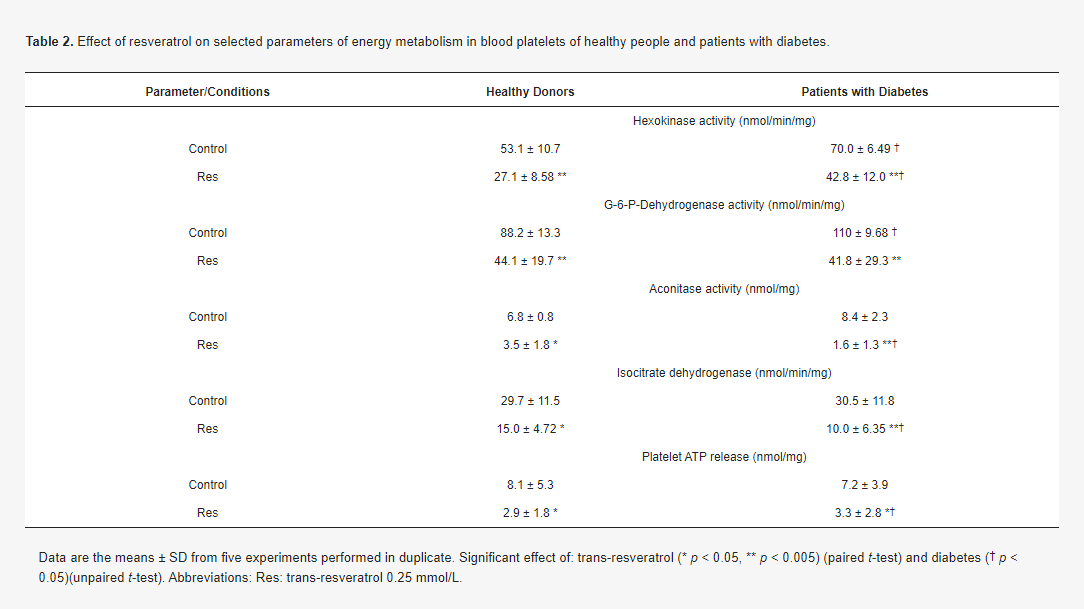Resveratrol is a polyphenol derived from plants with antioxidant properties that have been shown to enhance the activation of the body’s own self-repair proteins, called sirtuins. When sirtuins are activated, the effect is delayed aging, which has been demonstrated in a wide spectrum of experimental models, including mammals.
David Sinclair Has Called NAD+ “The Fuel” and Resveratrol “The Ignition”
NAD+ is the power source required by sirtuins in order to function. As such, Dr. David Sinclair has often called NAD+ “the fuel” and resveratrol “the ignition”. Both work synergistically to fight aging.
Analysis of 25 Previous Studies Show Potential for Dramatic Benefits of Resveratrol
A new analysis of a combined 25 previous research articles, numbering well over 1,000 participants according to the authors concluded that resveratrol had a dramatic impact in regulating both lipid and glucose metabolism. Disturbed lipid metabolism and excessive lipid accumulation in the obese has been connected with higher human morbidity. A tremendous amount of animal and clinical studies had proved that resveratrol could improve chronic diseases, especially metabolic syndrome.
“Resveratrol has a dramatic impact on regulating lipid and glucose metabolism”
“Resveratrol supplementation significantly decreased TC and LDL-C in patients with T2DM”
“Resveratrol intake had a significant effect on WC, HbA1c, TC, LDL-C, and HDL-C reduction”
“The pooled results of body weight, fasting glucose, and HOMA index had significant changes”
“Resveratrol intake can reduce glycosylated HbA1c and blood glucose, and exhibits long-term glycemic regulation”
Other potential benefits include:
- Decrease in waist circumference
- Decrease in hemoglobin A1c
- Decrease in total cholesterol
- Reduced fasting glucose
- Reduced urea levels
- Increased insulin sensitivity
The findings indicated that resveratrol supplementation exerts anti-obesity effects by regulating glycolipid metabolism and improving metabolic disturbances. The study concluded that Resveratrol was also of major clinical value to obese and diabetic patients. (1)
Another Study Finds Resveratrol Important For Vascular Health
In another recent study titled “Resveratrol Inhibits Metabolism and Affects Blood Platelet Function in Type 2 Diabetes“, resveratrol was shown to have a positive effect on vascular health and type 2 diabetes. This study showed that resveratrol inhibited thrombus (blood clot) formation and Thromboxane A2 (TXA2) in type 2 diabetes.
“This implies the benefit of resveratrol for preventing vascular complications as a future complementary treatment in aspirin-resistant diabetic patients” (2)

The study also found that:
- In the type 2 diabetes group prior to the trial, plasma glucose and fructosamine concentrations were significantly higher than in the healthy group
- In in vitro studies prior to the trial, collagen-induced thrombi formation in the blood of diabetic patients was 33% higher than in the healthy group.
- Resveratrol reduced thrombi (blood clots) by over 50% in the blood of healthy and diabetic patients.
- Prior to the trial, TXA2 production was 47% higher in diabetic platelets than in the healthy group
- Resveratrol reduced TXA2 release by 38% in healthy platelets and by 79% in diabetic platelets
- Resveratrol also reduced the activities of enzymes responsible for glycolysis and oxidative metabolism
3rd Study Finds Resveratrol May Reduce Amyloid Production in Alzheimer’s
In another study titled “Neuroprotective Effect of Trans-Resveratrol in Mild to Moderate Alzheimer Disease: A Randomized, Double-Blind Trial“, resveratrol was used to treat the buildup of plaque formation from amyloid proteins in Alzheimer’s patients.
Amyloid Proteins Known to Be Major Cause of Alzheimer’s Disease
The build up of amyloid proteins in the brain is known to be a major cause of Alzheimer’s disease, which is affecting a growing number of elderly people each year. A new study investigated the effects of trans-resveratrol on mild to moderate Alzheimer’s patients as well as its safety and tolerability.
Resveratrol Significantly Reduced Amyloid β Protein Levels and Has Neuroprotective Properties
Resveratrol was shown to significantly reduce levels of amyloid β protein compared to patients in the control group. These results indicated that trans-resveratrol could have neuroprotective properties in treatment of mild to moderate Alzheimer’s disease, reducing the accumulation of toxicity from amyloid proteins and reducing neuroinflammation. (3)
4th Study Finds Resveratrol Combined With Stem Cells An Emerging Treatment For Diabetes
In another recent study titled, “The combined therapy of mesenchymal stem cell transplantation and resveratrol for diabetes: Future applications and challenges” it was shown that resveratrol controlled the harsh internal environment of diabetics, making it possible for transplantation of mesenchymal stem cells (MSCs) to be possible. The combination of resveratrol and mesenchymal stem cells is considered a promising emerging treatment strategy for diabetes.
The study showed the following therapeutic effects of this combination therapy strategy on diabetes:
- Glycemic control
- Anti-inflammatory
- Anti-oxidative stress
- Anti-fibrotic
The study also explained the mechanisms of mesenchymal stem cells and resveratrol in diabetes treatment from 3 aspects, including
- Promoting cell survival and inhibiting apoptosis
- Inhibiting histiocyte fibrosis
- Improving glucose metabolism.
These findings assist in understanding the in-depth process for treatment of diabetes as well as helping to propose a possible treatment strategy for diabetes and all its complications. (4)
Increasing research into Resveratrol’s powerful anti-aging benefits
Research into resveratrol’s powerful anti-aging benefits has been increasing, with nearly 1,500 studies performed last year alone. Resveratrol’s possible neuroprotective qualities and defense against atherosclerosis, slowing down the damage from aging, has increased awareness of resveratrol. There may be many additional benefits of this powerful supplement waiting to be discovered.
References:
1 – Efficacy of Resveratrol Supplementation on Glucose and Lipid Metabolism: A Meta-Analysis and Systematic Review
2 – Resveratrol Inhibits Metabolism and Affects Blood Platelet Function in Type 2 Diabetes
